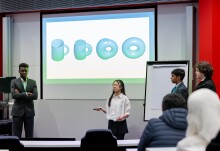

Imperial researchers to work with mining company Rio Tinto to develop sustainable mining techniques <em> - News</em>
See also...
For Immediate Release
Friday 22 May 2008
Advanced mining and mineral processing techniques to extract minerals from deep within the Earth will be developed thanks to the establishment of a new £6 million research centre, announced today.
The centre is a partnership between Imperial College London and mining company Rio Tinto aimed at developing the mine of the future. It will push forward the development of innovative mining technologies and techniques to improve the extraction of minerals, whilst minimising environmental impacts.
Minerals used to produce valuable metals such as copper, used in electrical wiring, or nickel, used to make stainless steel, are becoming increasingly hard to find and recover using traditional mining methods. Because of this extracting these minerals efficiently from deeper underground is becoming an important focus for mining research.
The Rio Tinto Centre for Advanced Mineral Recovery will develop a range of new mining technologies that use less energy to mine more minerals from hard to reach places deep underground.
Scientists will be developing more efficient techniques for block caving. This exploits the natural fractures in rocks so that they break under gravity rather than by using explosives, making the mining process cheaper and safer.
Research will be undertaken to develop a deeper understanding behind the fundamental science of rock fracturing so that mines can be developed and operated with increased confidence.
Researchers will also design new sensing technology for use in block caving to measure the underground area containing minerals and the size and shape of these deposits, which would increase the efficiency of this mining process.
New ways of mining minerals which use acids to dissolve metals in rocks below the Earthâs surface will also be explored. These dissolved metals could then be pumped above ground and extracted from the acids.
Researchers believe this method would use less energy and remove the need to disturb land in open cut mines. It would also allow for minerals to be extracted from harder to reach places making it safer for miners who would not need to venture deep below the surface to carry out the extraction process.
Scientists will also work on improvements to current froth flotation technology which is a process for separating the valuable minerals from waste rock. This process uses bubbles to pick up the fine mineral particles, which separates them from the rock and lifts them into a foaming froth on the tankâs surface for collection.
Froth flotation uses bubbles to separate minerals from rock
Currently, it requires large amounts of energy to crush rocks finely enough in order for the minerals to separate. Researchers hope to develop a froth flotation system in which coarser rock particles can be separated, which would reduce the amount of energy needed, lowering costs and increasing efficiency levels.
Lead scientist, Professor Jan Cilliers, Rio Tinto Chair in Mineral Processing at Imperialâs Department of Earth Science and Engineering, says in a world where resources are dwindling, research carried out by the Centre will lead to improvements in the way mining is done. He says:
âIf we found copper close to a major city tomorrow then the associated environmental and social concerns would make it impossible for us to mine this resource. However, research to be developed by the Rio Tinto Centre for Advanced Mineral Recovery could make this a reality without any adverse impacts to the environment.â
Sir Richard Sykes, Rector of Imperial College London, says:
"This long-term research and development collaboration is a great example of how industry and academia can work together to drive economic competitiveness and to benefit the environment. Imperial and Rio Tinto have different but complementary strengths. By pooling them in this way we can develop innovative technological solutions and implement them speedily."
John McGagh, Head of Innovation at Rio Tinto, adds:
âThe alliance with Imperial College is a key element in delivering the Rio Tinto mine of the future. This approach is based around optimising all stages of the mineral extraction process, resulting in maximum recovery rates while minimising the mining footprint. We aim to work with the best research groups in the world, and Imperial College are an obvious partner in the field.â
The £ 6 million funds will be used over a 5-year period and will see six postdocs and 12 researchers employed at Imperialâs Department of Earth Science and Engineering to carry out research in this field.
-Ends-
For further information please contact:
Colin Smith
Press Officer
Imperial College London
Email: cd.smith@imperial.ac.uk
Tel: +44 (0)207 594 6712
Out of hours duty press officer: +44 (0)7803 886 248
Nick Cobban
Media Relations â Rio Tinto
Office: +44 (0) 20 7781 1138
Mobile: +44 (0) 7920 041 003
Email: nick.cobban@riotinto.com
Notes to editors:
1. About Imperial College London
Imperial College London - rated the world's fifth best university in the 2007 Times Higher Education Supplement University Rankings - is a science-based institution with a reputation for excellence in teaching and research that attracts 12,000 students and 6,000 staff of the highest international quality.
Innovative research at the College explores the interface between science, medicine, engineering and business, delivering practical solutions that improve quality of life and the environment - underpinned by a dynamic enterprise culture. Website: www.imperial.ac.uk
2. About Rio Tinto
Rio Tinto is a leading international mining group headquartered in the UK, combining Rio Tinto plc, a London and NYSE listed company, and Rio Tinto Limited, which is listed on the Australian Securities Exchange. Rio Tinto's business is finding, mining, and processing mineral resources. Major products are aluminium, copper, diamonds, energy (coal and uranium), gold, industrial minerals (borax, titanium dioxide, salt, talc) and iron ore. Activities span the world but are strongly represented in Australia and North America with significant businesses in South America, Asia, Europe and southern Africa. Website: www.riotinto.com
Article text (excluding photos or graphics) available under an Attribution-NonCommercial-ShareAlike Creative Commons license.
Photos and graphics subject to third party copyright used with permission or © Imperial College London.





